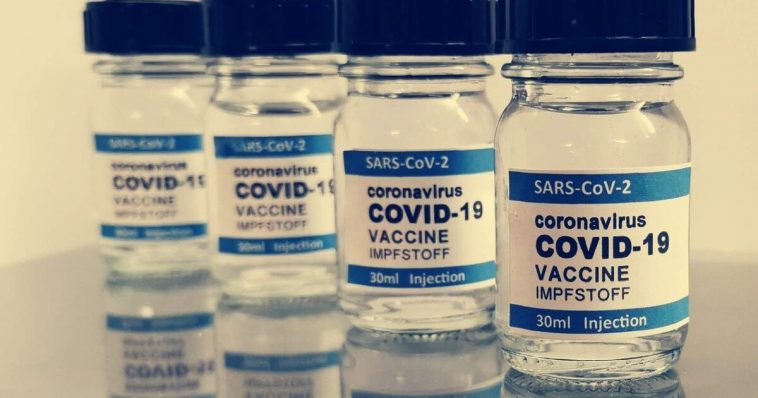From 100PercentFedUp - READ ORIGINAL
Some media, including videos, may only be available to view at the original.
According to a new study published in the International Journal of Biological Macromolecules, modified mRNA used in COVID-19 injections could potentially aid cancer development.
“Mounting evidence indicates that these vaccines, like many others, do not generate sterilizing immunity, leaving people vulnerable to recurrent infections. Additionally, it has been discovered that the mRNA vaccines inhibit essential immunological pathways, thus impairing early interferon signaling,” the researchers wrote.
“Within the framework of COVID-19 vaccination, this inhibition ensures an appropriate spike protein synthesis and a reduced immune activation. Evidence is provided that adding 100 % of N1-methyl-pseudouridine (m1Ψ) to the mRNA vaccine in a melanoma model stimulated cancer growth and metastasis, while non-modified mRNA vaccines induced opposite results, thus suggesting that COVID-19 mRNA vaccines could aid cancer development,” the researchers continued.
“Evidence is provided that adding 100 % of N1-methyl-pseudouridine (m1Ψ) to the mRNA vaccine in a melanoma model stimulated cancer growth and metastasis, while non-modified mRNA vaccines induced opposite results, thus suggesting that COVID-19 mRNA vaccines could aid cancer… pic.twitter.com/kXKE2rXp4f
— Chief Nerd (@TheChiefNerd) April 20, 2024
“Based on this compelling evidence, we suggest that future clinical trials for cancers or infectious diseases should not use mRNA vaccines with a 100 % m1Ψ modification, but rather ones with the lower percentage of m1Ψ modification to avoid immune suppression,” the researchers wrote.
The Epoch Times reports:
Modified and natural RNA stimulate different responses in the body. Modified RNA tends to produce more aberrant proteins, potentially contributing to cell genome instability.
Most importantly, modified RNA induces a more muted response in the body than natural RNA, which may have broad implications for the body’s ability to fight other infections and cancers.
The authors cited studies finding that natural RNA tended to stimulate the activity of type-1 interferon—a key anti-tumor substance—and other immune chemicals. Contrastingly, modified RNA stimulates a milder response and is associated with immune chemicals that promote tolerance of foreign RNA injections.
An earlier study found RNA containing modified uridine failed to activate a pathway known to be involved in detecting viral infections and fighting cancers.
They also cited Ms. Kariko and Dr. Weismann’s paper which found mRNA modification suppressed immune recognition and activation of immune cells. The authors argue that this was a double-edged sword, due to wide-reaching immune consequences.
A critical piece of evidence the review authors cited comes from a mice study in Thailand.
In the study, researchers injected natural mRNA and 100 percent modified RNA into two different groups of mice with melanoma.
The Thai researchers found that when injected with natural RNA, the body had a more robust immune response than when injected with modified RNA.
Furthermore, the prognosis of the melanoma mice also differed.
The survival rate in the mice group without modified RNA was 100 percent. Conversely, in the group with the modified uridine, only half of the mice survived.
In their abstract, the Thai researchers wrote that an mRNA vaccine induces type-1 interferon production and downstream signals crucial for controlling tumor growth and metastasis.
Modified RNA in COVID Vaccines May Contribute to Cancer Development: Review
Researchers argue that modification to mRNA causes immune suppression that may contribute to cancer development.https://t.co/Q8qM0utXDi
— The Epoch Times (@EpochTimes) April 22, 2024
BREAKING: A review in the International Journal of Biological Macromolecules has found that COVID-19 mRNA vaccines could aid cancer development.
The researchers suggest that future clinical trials should not use certain mRNA vaccines in order to avoid immune suppression.
Wow.
— Dr. Simone Gold (@drsimonegold) April 16, 2024
From ScienceDirect:
m1Ψ use in COVID-19 mRNA vaccines
m1Ψ was added in 2020 to Pfizer-BioNTech’s COVID-19 mRNA candidate vaccine (Comirnaty® or BNT162b2), which codes for the entire transmembrane spike (S) protein of SARS-CoV-2 [36]. A significant amount of m1Ψ-modified SARS-CoV-2 (COVID-19) spike mRNA was generated by extensive IVT. After demonstrating a favorable safety record and 95 % protection from the disease after a two-inoculation protocol (intramuscular injection), the Pfizer vaccine became the first mRNA vaccine to be fully licensed
Is m1Ψ a friend or foe of cancer?
The creators of the mRNA vaccines against SARS-CoV-2 have emphasized only the positive aspects related to the addition of m1Ψ: it was critical to diminish the disintegration of this synthesized mRNA as well as its immunogenicity to avoid an overly aggressive immune response. However, important investigations performed during this pandemic have demonstrated that mRNA-based and inactivated vaccines temporarily disrupt IFN signaling
BREAKING: New published study by an international team of researchers confirms what some medical experts have been suspecting for 18 months:
The COVID mRNA shots containing N1-methyl-pseudouridine SUPPRESS the immune system and STIMULATE cancer growth! https://t.co/CwKD14ZQc9 pic.twitter.com/W530bWiVcK— Ned Nikolov, Ph.D. (@NikolovScience) April 16, 2024
Prior reports stated cancer rates are expected to hit a record high this year.
Per Axios:
New cancer diagnoses in the U.S. are expected to top 2 million for the first time in 2024, driven in large part by an alarming increase in cancers among younger Americans, according to new American Cancer Society data.
There have been major improvements in cancer survival, but there’s a worrying rise in some cancers at the same time doctors are trying to figure out why they’re seeing more young patients with cancer.
This demographic shift comes with psychological, physical and financial burdens that are less common with older patients, experts say.
Patients under 50 are more likely to be uninsured, juggling career and caregiving responsibilities, and face a higher lifetime risk of treatment-related side effects like second cancers.
“It’s overwhelming for anybody, but especially for these younger patients who are going on with their daily lives and then suddenly get this life-altering diagnosis and really don’t know where to turn,” Robin Mendelsohn, co-director of the Center for Young Onset Colorectal and Gastrointestinal Cancers at Memorial Sloan Kettering, told Axios.
Read the study at ScienceDirect.


